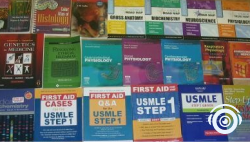
At least 6% of first-year med school students will not become a doctor within seven years, according to a study by the Association of American Medical Colleges.
But how many of the 94% who do finish medical school will actually thrive during those years. We’re not claiming the road to becoming a doctor is easy or even moderately difficult. It’s extremely difficult, but some students make it even harder than it has to be. Don’t be one of those students. Instead, scroll down for some great advice and med school study tips to become the shining star of your class starting from your first year.
What to Expect as a First-Year Medical School Student
As a first-year medical student (M1), you should expect to be busy, busy, busy. Your course load will consist of four to five classes, labs, and loads of studying. Your day-to-day will be jam-packed, and you may find yourself juggling many responsibilities at once. Don’t let this intimidate you. While your first year may be tricky to navigate, you’ll eventually find a groove and balance to it all.
What to Do Before Medical School
Well, what you should do is figure out how to prepare for med school! If you’re pre-med, you should have all the classes needed for med school. After you’ve completed the MCAT and accepted admission to medical school, you’re ready to complete the paperwork. Submit any requested personal records and documentation to your school. This can include things like transcripts, degree verification, vaccinations, and other forms.
Furthermore, you should be well prepared financially. Don’t miss important deadlines for financial aid or student loans, and get to know the cost of living in your area. Budgeting is really important in med school—especially if you’re moving closer to campus. Other than that, you just need your affairs in order! Don’t forget to consider transportation, school supplies, your grocery list, and other necessities.
Mistakes to Avoid as a Med Student
As a M1 medical student, there’s a list of do’s and don’ts you need to follow. Here’s what you should avoid:
- Skipping class: While lectures may be recorded and you may receive the provided slides, notes, or textbook pages for the class, you shouldn’t purposefully miss it! This is your chance to absorb information in a distraction-free learning environment and ask questions if you need be.
- Cramming for exams: Cramming can be convenient when you’ve procrastinated, but you should never wait until the night before to start studying! Instead, make a schedule to study routinely—space out your sessions in a timely manner to improve your chances of getting a good grade and helping future-you (also known as MDyou) recall information. For new study go-to’s, use this ultimate guide to M1 study tools.
- Doing too much: Overcrowding your day-to-day schedule is overwhelming and stressful. If you spread yourself too thin, you’ll feel the impact on your well-being and academic performance. Pick and choose what’s most important to you and your goals, and leave the rest behind.
- Not prioritizing yourself: It’s easy to dedicate your whole world to medical school, but you should make time for activities you enjoy and practice self-care. Eat and sleep well, reach out to friends and family for support, and walk into class each day with a positive mindset. Take this year little by little, and be kind to yourself. Not everyone gets it right on their first try, and the joy in learning is trying until you do!
Failing med school? Read these tips and bounce back.
Tips on How to Survive Medical School
Use these med school study tips to become the shining star of your class starting from your first year.
1. Get Realistic, Real Realistic

The quantity of material you need to remember is far beyond what you had as a pre-med. Most college classes pale in comparison to the material presented in medical school. Many students waste time in their first year of med school. Do not underestimate the magnitude of the material, and do not waste time in the beginning. Find the right study tools that work for you and get into a regular habit of reviewing the material. (Tip: find tools that offer spaced repetition. You will make the most of your study time by retaining more of what you study, long term).
Let this humble you, but don’t let it frighten you. Like the many who came before you, you can do this!
2. Become the Master of First-Year Med School Organization

If you’ve always been unorganized and chalked it up to a whimsical personality or absent-minded genius charm, now is the time to stop. For the next few years, you must make it a practice to be very organized. It’s best to start your first year off right, by creating these organizational habits. You’ll need to keep track of your medical school schedule, slides, lecture notes, book notes, and required reading. So. Much. Reading.
Input important dates immediately and, if your calendar is digital, set reminders. Save paperwork related to each course in one spot. Consider a note-taking/organization app like Evernote. Prepare as much in advance as possible by purchasing notebooks, highlighters, page tabs, notecards, and everyone’s favorite med school study partner, Picmonic.
With Picmonic for medical students, your high-yield facts for medical school and great medicine lectures for medical students are all in one place—your Picmonic account. Then, with just a click of the mouse, you can organize Picmonic videos by subject, keywords, ranking of how well you know the material, and more. You can also search for any Picmonic, meaning no more hurriedly shuffling through a deck of cards or stack of notes to a topic.
3. Determine Your Study Style Early On In Your First Year

Once you’ve come to terms with the amount of information there will be, figure out how you most efficiently and effectively can master it. Understanding how to study in medical school will be your key to success in the long term. For example, will you need to read the lecture before class or rewrite your notes after? Are you a visual learner? Are you a strong note taker and can you keep up during lectures, or should you review recorded versions of them so you can slow it down or pause it? Do you learn better during a lecture or by reading notes, books, and other materials on your own?
And do you study best alone or as part of study groups?
This last question is especially important as it relates to who you’ll study with during medical school if anyone.
If you already know you’re a one-man wolf pack for studying, then skip to the next tip.
If you think there’s something to be gained from studying with a partner or in a study group, we advise you to choose these study buddies wisely. Some people study best by quizzing each other. Others learn by teaching one another. You may just enjoy studying in the presence of another medical student without actually interacting.
Once you are comfortable with how to study in medical school, figure out what works best for you, and figure it out fast. Study time is not the time to make lifelong friends or socialize. If you’re not studying effectively with a classmate, do both of you a favor by ending the study relationship and finding a better fit. Answering all of these questions sooner and finding your best study methods in your first year will help you save time and sanity in the long run for things like Step 1 and other exams throughout school and your career.
4. Don’t Limit Yourself in Med School
Every word spoken in lecture or written on the syllabus, slides, or notes could become a question on an exam. Don’t think you’re going to get all the information by attending every class and not reading the lecturer’s notes. Likewise, medical students are wise to not assume all the important information will be contained in the notes and slides.
In other words, all those different materials exist for a reason. You will likely need to leverage a combination of lectures, review books, question banks, and mnemonic study aid to truly learn and retain everything you need to know. Take some time to figure out what works for you and stick with it.
For more tips on what to expect and how to succeed throughout your medical school journey, read “From 1st to 4th Year: How to Operate at Your Best in Medical School” written by a practicing physician who scored 268 on STEP 1.
5. Remember Your “Why”

As a medical student, there will be times when you feel like giving up…usually at the end of an 80-hour study week. Keep something around that reminds you of why you want to become a doctor and what you will contribute to the world when you finish medical school.
Is it a picture of a loved one who passed away from a (currently) incurable disease? Is it a picture you drew as a kid of your white-coated future? Is it a copy of Patch Adams? A copy of Dr. Suess?
Whatever the reason was that spurred you to finish undergrad, pass the MCAT, and get into medical school, it’s a worthy reason. Let it be a beacon of hope for you on the most difficult days.
For some inspiration and advice on loving life in medical school, check out this Q&A webinar by Ron Robertson, Co-Founder of Picmonic, and the Happy Doc.
You’ve Got This
At Picmonic, we’ve heard the cries (literally…tears) and seen the struggles of medical school students. Our own co-founders were in your shoes once, when they were inspired by the study struggle to create a new learning system proven to increase memory retention and improve test scores. What we’ve also seen in medical school students is an incredible strength of spirit, mental fortitude and the ingestion of what can only be categorized as a monumental amount of coffee. Picmonic will be here for you from day one through Step 1 and beyond.
You can do this.
Frequently Asked Questions About Your First Year of Med School
How do you thrive in medical school?
Well, you start by reading this blog! Thriving in med school is mostly about time management and finding the right study tools, early. This way you’ll always be prepared for exams, course work, and your future medical board exams. You’ll also become organized and adaptable. Try to adhere to your schedule, but make time for self-care, and don’t lose it if things go awry. If you need to, don’t be afraid to lean on your friends or mentors for support—whether it’s academically or personally. Med school is hard, and you don’t have to do it alone.
Can you have a life during med school?
You can—and should—have a life as an MS1 (that’s shorthand for “first-year medical student”). Having a social life and fostering relationships outside of your medical school circle is imperative to avoiding burnout early. Sure, you’ll be busy. Schedule one day a week, or even every other week, to stop, relax, connect with yourself and others, and indulge in a hobby or just some self-care. This is the best way to survive med school—and enjoy it. When you create interpersonal connections, it will help you network too!
How do medical students survive?
If you’ve watched Grey’s Anatomy, Scrubs, or The Resident, you probably think medical residents and medical students survive on caffeine, adrenaline, and a whole lot of bravado. The truth is, this is probably true. Cramming late at night (doesn’t work, by the way). Endless questions banks. Erratic sleep patterns. Too much coffee. Sure, these things will help you survive medical school. But you, friend, you’re going to thrive. You’re going to study smarter, not harder. You’re going to get plenty of rest and eat well (might we suggest a Sunday meal prep day). You are going to ace medical school and all that comes with it. Plus, you’ll eventually find a way to balance it all—your social life, school, studying, and even working. You’re bound to succeed when you get in the swing of things so be patient with yourself.
Is the first year of medical school the hardest?
Ask any physician or recent med school grad and they will tell you the first year of med school is the hardest, and research would back them up. You most likely don’t know anyone. You’re in an unfamiliar town. It feels as if the information you’ve learned up to this point hasn’t prepared you for anything. And the amount of complex medical topics being taught is overwhelming. Conquer the first year of medical school with these simple strategies, and use resources like Picmonic, then you’ll be on your way to laying the foundation for a thriving career in medicine (and even being top of your class).
How many classes do you take during your first year of medical school?
You can expect to take four to five classes as an M1 medical student. Your classes will be across different disciplines, but you can expect to explore the sciences, clinical foundations, and electives. You can expect to take biology, chemistry, physiology, and more. These classes are didactic lectures accompanied by labs.
How do you mentally survive med school?
Mentally surviving med school is all about preparation. By preparing, managing your time wisely, adopting smart study methods, and leveraging the stress management techniques that work for you. Again, this means taking care of your physical health as well. Being active, even if it’s just walking, can help if you’re a med student prone to stress.
What is the success rate of med school?
According to the Association of American Medical Colleges (AAMC), 80-90% of four-year MD-only U.S. medical students graduate from their program. For six-year programs, this rate is 96%. To be a part of a successful med student, leverage your study tools and resources to ace your exams.
What do I need to be successful in medical school?
Success in medical school depends mainly on your time management, connections, and using the right tools for you. Make sure you take detailed notes, review them regularly, and don’t be afraid to ask questions. You might even benefit from creating a study group with fellow med students and leveraging visual learning and mnemonics which is a great way to absorb and remember all the info you’ll need to ace your med school exams. Also, don’t forget to use Picmonic to learn those medical mnemonics.
What percentage of people fail med school?
According to the Association of American Medical Colleges, the attrition rate of U.S. medical students has remained at a relatively stable 3.2% throughout the last twenty years. The truth is the majority of these students don’t necessarily fail med school. They leave for reasons outside of their academic success, including financial, burnout, and personal circumstances. So don’t that number intimidate you. If you’re truly passionate about entering medical school and being in healthcare, you can do it.
What percent of med students become doctors?
First and foremost, it is important to highlight that not all medical students attend med school to become doctors. Yes, that seems like a lot of work without the proper payout for some, but career paths and personal goals and choices play a large part in determining if a med student will become a doctor. That being said, according to the Association of American Medical Colleges (AAMC) 96% of students who participate in six-year programs graduate. Though, it is difficult to identify information beyond this, specifically how many med students actually become doctors.
What is the life of a medical student?
The life of a medical student is what you make of it! In your first year of medical school, you may easily be overwhelmed. But remember, you’re not alone. You’ll spend long hours in classes, reviewing notes, being in labs, and joining clubs, if you’re interested. Your first year is the most important as you’ll be learning the fundamentals you’ll need throughout the rest of your medical student career.
As you learn basic human physiology, histology, anatomy, and biochemistry, avoid cramming, taking too much on, missing class, and being hard on yourself. You’ll need to balance a lot to survive and thrive, but be open-minded to advice from your instructors, peers, and upperclassmen—you might find it helpful.
Download our mobile app and take Picmonic on the go!















